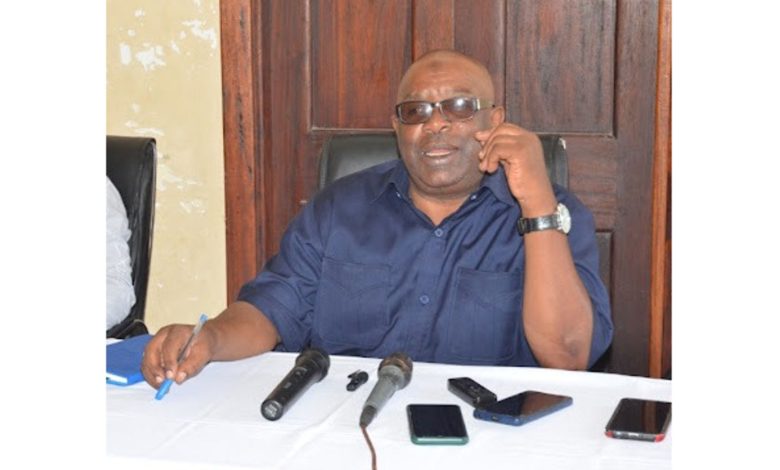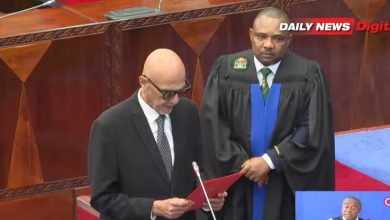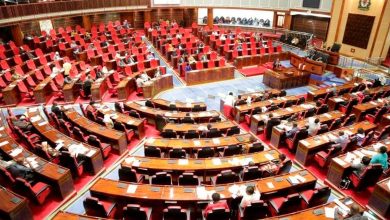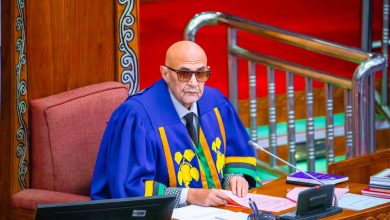KNOW YOU CANDIDATE: MR HAJI KHAMIS NCCR-Mageuzi Presidential Aspirant

DAR ES SALAAM: BORN in 1960 in Southern Pemba, Haji Ambar Khamis’ life story is a tale of resilience, perseverance and vision.
From his humble beginnings as a village boy to becoming the presidential candidate of the National Convention for Construction and Reform (NCCRMageuzi), his journey reflects a deep desire to serve the people of Tanzania.
For many Tanzanians, Mr Khamis is not just another politician seeking high office.
He is a man whose personal story mirrors the struggles of countless citizens—navigating limited opportunities, striving for education, working abroad and ultimately returning home with a commitment to build a better future for his country.
“I come from a place where education was a privilege and I seized every opportunity,” Mr Khamis recalls.
Growing up in Southern Pemba, young Haji was surrounded by a community where schooling was far from guaranteed.
Many children dropped out due to poverty, but he was determined to push forward.
His first step was Uoleni School in Pemba, where his natural talent and determination propelled him forward.
He later joined Mikunguni Technical College, where he specialised in civil engineering.
With promising results, he qualified to advance to Bweni Technical College for higher studies. Yet fate had other plans. Like many ambitious young men of his generation, his curiosity and zeal led him to seek opportunities beyond Tanzania’s shores.
He turned to seafaring, working in Europe, where he gained exposure to new cultures, work ethics and systems of governance. But even as he earned a living abroad, something tugged at him—the call of home.
“After some time abroad, I realised that my true calling was back home, to contribute directly to my people,” he reflects.
Returning to Tanzania, Mr Khamis redirected his ambition from engineering to politics, convinced that real transformation lay in leadership.
His political journey began in 1995 when he helped establish the Tanzania Democratic Alliance (TADEA) in Zanzibar. Later that same year, he joined NCCR-Mageuzi, drawn by its promise of reform and its commitment to fight corruption and injustice.
Although he faced early setbacks, including narrowly losing a parliamentary race in his home constituency, he was not discouraged.
“I learned early that in politics, perseverance is key. Losing one election does not mean the fight is over,” he says.
Over the next three decades, Mr Khamis played crucial roles within NCCRMageuzi. In 1999, he became a key member of the party’s Board of Trustees.
From 2000 to 2024, he served as Deputy Chairman, shaping strategy and mentoring younger politicians. Since 2022, he has been acting Chairman, leading the party through a period of internal restructuring and renewal.
His decision to run for the presidency in the 2025 general elections was, in many ways, the natural culmination of his long service.
At the core of his campaign is a manifesto designed to address Tanzania’s most pressing challenges while laying the foundation for a fairer, more inclusive society. “Our people deserve a government that prioritises health, education and fairness,” he declares. “NCCR-Mageuzi is committed to building a Tanzania where no one is left behind.”
For Mr Khamis, unity and good governance are inseparable. He advocates for the drafting of a new constitution before the 2030 elections to strengthen democracy, decentralise power and enhance accountability.
“We need a constitution that ensures leaders are accountable to the people and institutions function independently,” he insists.
He also pledges to establish an independent National Electoral Commission and intensify anti-corruption measures—two areas many Tanzanians see as critical for restoring trust in public institutions.
Few issues resonate with him as strongly as education. Drawing from his own journey, he believes education is the gateway to opportunity.
His proposals include revising the curriculum to meet both local and global demands, introducing school meals to improve learning, electrifying schools to support ICT integration and reducing the duration of secondary education from four to two years without tuition fees. “At least 30 per cent of the government budget will go to education. Our children’s future depends on it,” he affirms.
Access to healthcare remains one of the most significant challenges in Tanzania and Mr Khamis places it at the top of his priorities.
His plan includes ensuring every village has a dispensary, every ward a health centre and every district a hospital. He also promises free healthcare for elders over 70 and affordable health insurance for all citizens. “Health is a fundamental right, not a privilege,” he stresses.
To tackle poverty and unemployment, he proposes revitalising agriculture, livestock and fisheries by equipping farmers and fishers with modern tools, training and access to reliable markets.
At the same time, he pledges to confront environmental degradation and climate change, noting that Tanzania’s wealth lies in its natural resources.“Our natural resources are our wealth and we must protect them for future generations,” he says.
Inclusivity is central to his vision. His manifesto pledges to uphold gender equality, protect people with disabilities and those with albinism, and empower the youth with soft loans to pursue entrepreneurship.
“True development is inclusive development,” he states firmly. Recognising the link between security and development, he promises better working conditions for security personnel and modern equipment to enhance safety. On infrastructure, he aims to ensure every district is connected through reliable roads and transport networks.
NCCR-Mageuzi also places emphasis on strengthening democratic institutions, promising to reduce taxes on media equipment, particularly in rural areas and make civil society registration simpler. “A vibrant civil society and free press are pillars of democracy,” Mr Khamis notes.
Beyond policy, what sets him apart is his grounded outlook on politics. Unlike many career politicians, he views leadership not as a path to personal enrichment but as a calling. “Politics in Tanzania is not about personal gain; it’s a calling to serve,” he says. As he campaigns across the country, he appeals to Tanzanians with a message of hope, unity and reform. He insists his vision is not about replacing one leader with another but about reshaping governance for generations to come.
As the 2025 General Election approach, Mr Khamis and NCCR-Mageuzi stand as underdogs in a contest dominated by larger parties. Yet, his candidacy injects a vital voice into the national conversation: One that champions integrity, fairness and people-centred policies. For Tanzanians who have long yearned for reform, his presence on the ballot symbolises resilience and the power of persistence.
From the sandy soils of Southern Pemba to the national political stage, Haji Khamis’ journey is a testament to how determination, vision and service can shape a leader and perhaps, a nation.





